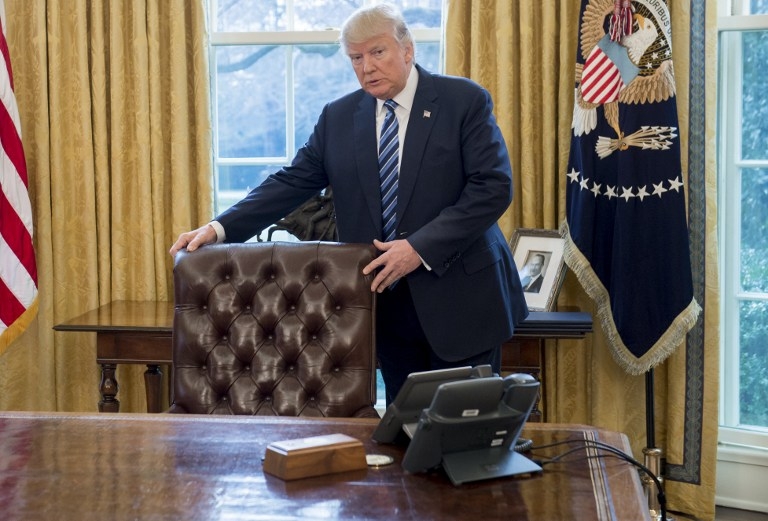Trump and Netanyahu: It wasn’t supposed to be like this

It wasn’t supposed to be like this. Israeli Prime Minister Netanyahu’s first Washington visit of the Trump era was to have been a joyful triumph, officially celebrating the departure of the hated Obama and the dawn, finally, of an administration fully supportive of the right-wing Israeli agenda.
Or so, at least, Netanyahu had every reason to think. After all, hadn’t then president-elect Trump attacked Obama for his abstention on a UN resolution condemning Israeli settlements in the West Bank, promising that “things would be different” after 20 January?
Netanyahu provided Israel’s Western backers with a threadbare cover. Now Naftali Bennett and company are stripping off all of their fig leaves
Hadn’t he named as his prospective ambassador to Israel a diplomatic neophyte, loudly and generously supportive of the Israeli settlement project and overtly opposed to the two-state solution? Had he not made clear that his son-in-law Jared Kushner, an orthodox Jew, known supporter of settlements and son of a personal friend to Netanyahu, would lead US peace efforts in the Middle East?
READ: David Friedman, the crusader
And hadn’t he promised to do what no US president had previously dared: to move the US embassy from Tel Aviv, signifying American support for Jerusalem as Israel’s "eternal, indivisible" capital?
Testing the waters
By mid-January, the Israeli right was understandably giddy with anticipation. In the days after Trump’s inauguration, as though to test the waters, Netanyahu announced the construction of some 6,000 new housing units, including the first entirely new West Bank settlement since the 1990s.
The White House reaction? A tepid assertion from spokesman Sean Spicer that while the White House did not consider settlements an impediment to peace, new building “may not be helpful” in achieving it. Maybe not a ringing endorsement, but hardly a firm rebuke – and seen indeed by some as a tacit green light.
READ: Israel's settlement law: From occupation to annexation
In the meantime, Naftali Bennett and the Israeli extreme right set about pressing their seeming advantage as far as they could. Last Monday, they passed a bill in the Knesset to permit a sort of rolling eminent domain, allowing the government to seize private Palestinian land in order both to legitimise past settlement construction previously held illegal even under Israeli law, and to facilitate more such construction in future.
Israeli measures, both public and private, direct and indirect, to separate Palestinians from their land are hardly new, but this was qualitatively different from anything seen before. Likud’s Dan Meridor, not particularly noted as a defender of Palestinian rights but, as a former justice minister, better instructed in the legal implications of this act than most, was particularly passionate in arguing against it.
By exerting civilian legislative control over Palestinian land rights, he argued, the Knesset was in effect asserting sovereignty over the Palestinian population, opening the door for them to claim Israeli citizenship and further making Israel vulnerable to prosecution in the Hague for gross violations of international law.
Stripping the fig leaves
Of course, the Palestinian land measure might yet be struck down by the Israeli Supreme Court, and its ultimate ramifications, both foreign and domestic, remain conjectural.
But if the legal questions surrounding this legislation remain woolly, the underlying politics could not be more clear. Israel’s gradual and seemingly inexorable rightward drift has put those on Netanyahu’s right flank in the driver’s seat, greatly reducing his room for manoeuvre.
Israel's extreme right is forcing Netanyahu to expose his true positions in ways which create serious difficulties in allied capitals
Make no mistake, the differences here are more about means than ends. Neither the Likud nor the extreme right has any intention of allowing a Palestinian state worthy of the name. But where Netanyahu would prefer to take the cautious road, resorting to stealth and indirection when necessary to maintain some degree of international support, the extreme right is unapologetically – indeed, belligerently – straightforward about its aims. In the process, they are forcing the prime minister to expose his true positions in ways which create serious difficulties in allied capitals.
No one paying attention can genuinely believe in Netanyahu’s commitment to a two-state solution. What we see now is the moral outrage expressed by those whose disingenuousness is suddenly being held up to scrutiny. Netanyahu at least provided Israel’s Western backers with a threadbare cover. Now Naftali Bennett and company are stripping off all of their fig leaves.
The best worst deal
Under these circumstances, and not entirely sure of Washington’s reaction in the wake of his settlement announcement, Netanyahu would have much preferred to postpone the vote on private land seizures. But when his hand was forced, he had little choice but to come down in favour.
This was the environment into which Trump dropped the bombshell statements of this past weekend. In hindsight, maybe we should all have seen it coming. What is “land for peace”, after all, but an epic real estate deal? How could Trump ever turn away when the deal of the millennium is beckoning?
READ: Trump and Netanyahu: Mired in the swamp
Whatever his thinking, Trump quickly made all past indications look like a galactic exercise in misdirection. “I want Israel to act reasonably in the peace process and…it will finally happen after so many years.” “There is limited remaining territory…I’m not someone who believes that advancing settlements is good for peace.” He even backed away from his commitment to relocate the embassy.
Yes, this was a cruel turn. But let us not mourn excessively for Bibi Netanyahu. He may be facing several more years of playing the artful dodger, sparring with a delusional president working at cross-purposes with him. But Netanyahu holds all the high cards.
The two-state solution is indeed well and truly dead. Eventually Israel will annex most of the West Bank, and will face a choice between the unthinkable (Israeli citizenship for the Palestinians) and the indefensible (an apartheid state). The best Trump can do is create a delay in getting there.
No, Wednesday’s meeting wasn’t supposed to be like this. But if Trump and Netanyahu look distracted when they pose for the obligatory Oval Office handshake, it will be because Trump is dreaming of the ultimate deal he cannot have, while Netanyahu contemplates the wages of sin.
- Robert Grenier is a writer and speaker focused on foreign affairs, the Middle East, and counterterrorism. A former director of CIA’s Counter-Terrorism Center, he spent 27 years as an operative in CIA’s Clandestine Service. His memoir, 88 Days to Kandahar: A CIA Diary was published in 2015 by Simon and Schuster.
The views expressed in this article belong to the author and do not necessarily reflect the editorial policy of Middle East Eye.
Photo: US President Donald Trump stands behind his desk in the Oval Office of the White House in Washington, DC in February 2017 (AFP)
New MEE newsletter: Jerusalem Dispatch
Sign up to get the latest insights and analysis on Israel-Palestine, alongside Turkey Unpacked and other MEE newsletters
Middle East Eye delivers independent and unrivalled coverage and analysis of the Middle East, North Africa and beyond. To learn more about republishing this content and the associated fees, please fill out this form. More about MEE can be found here.








